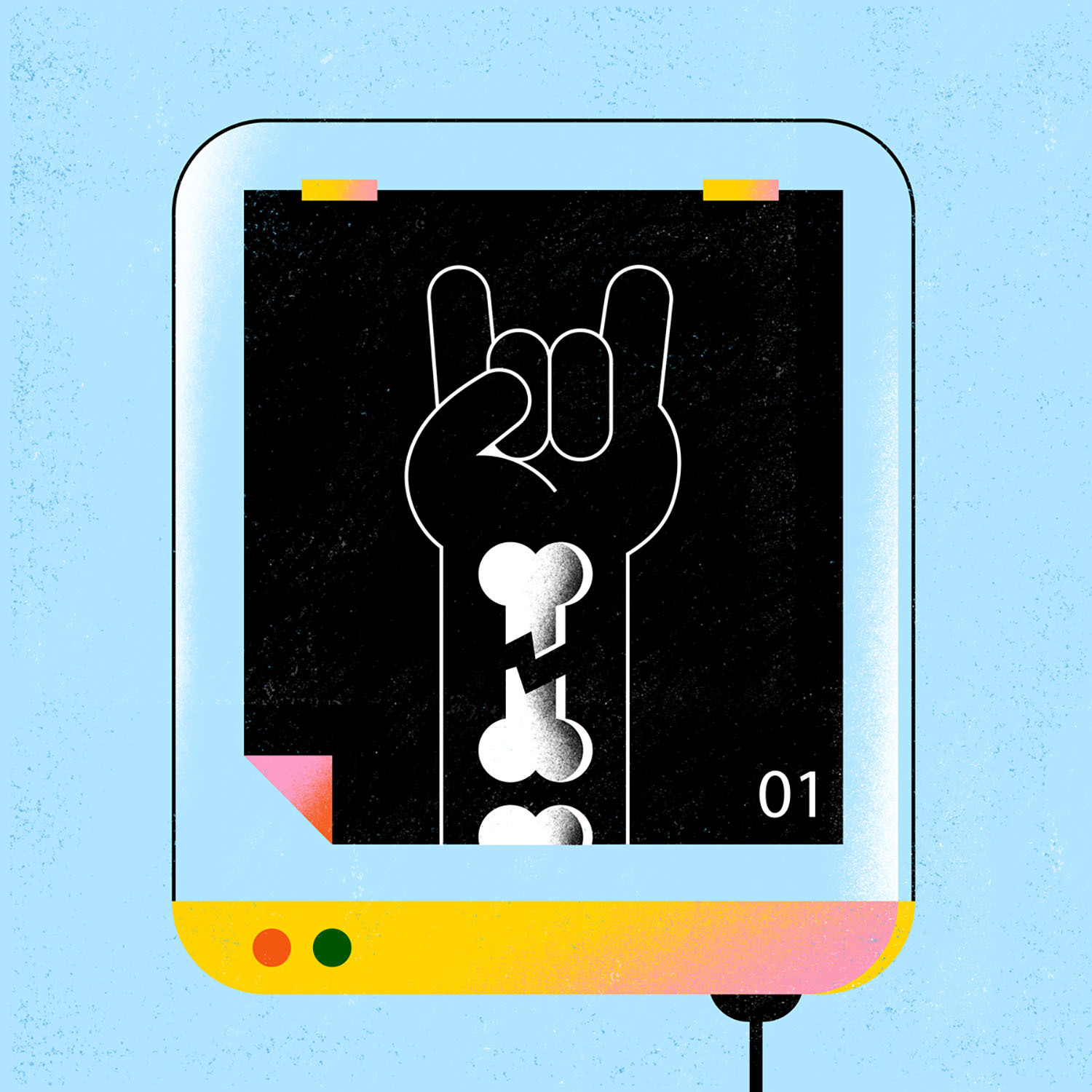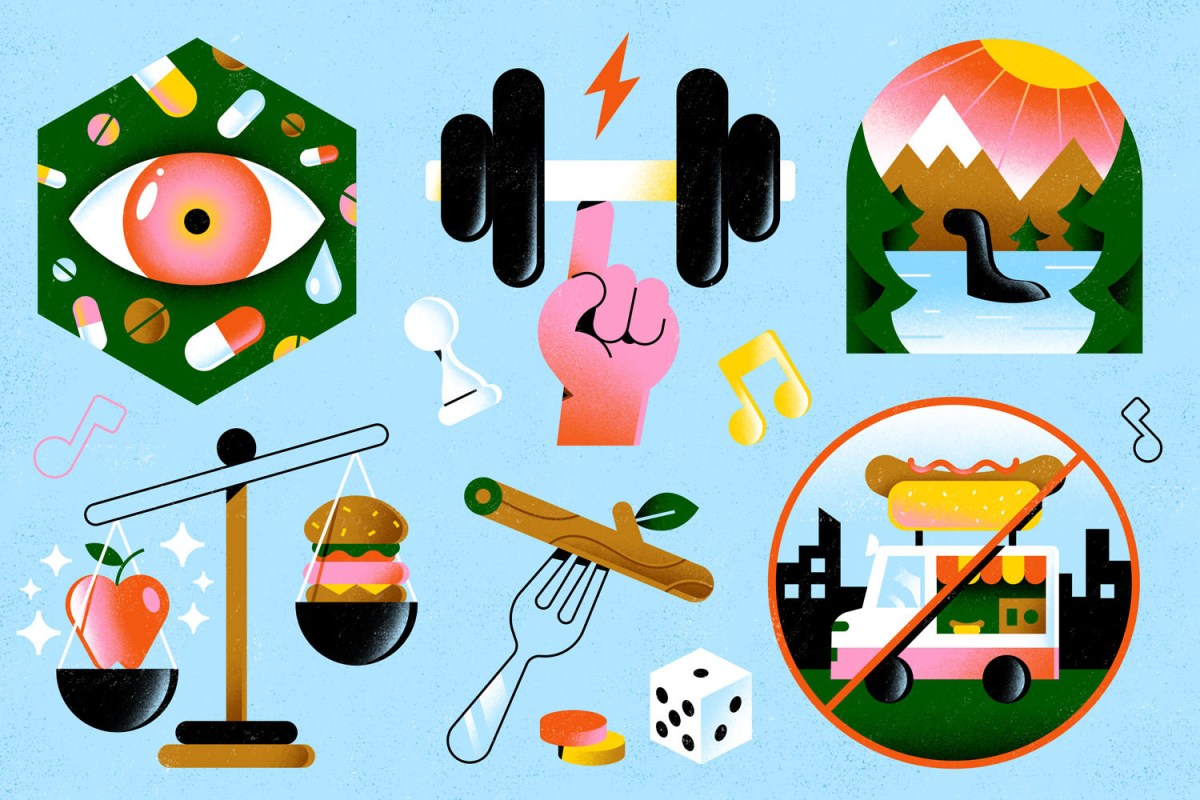At this point, we’re all familiar with the trope. A local news station visits a retirement home to celebrate Muriel’s 106th birthday. She’s deaf or blind or both or neither, sitting in a wheelchair in the “good spot” next to the TV set, and a reporter asks her her secret. You’ve lived through both World Wars?! How’d you do it? Then Muriel gets to flash a mischievous grin and tells us she smoked a pack a day for 50 years.
Interacting with centenarians in this way has long made them seem like circus oddities. It trivializes the concept of lifespan and longevity, reducing the science to a throw-your-hands-in-the-hair “Who the hell knows!” It reinforces the idea that our time on this planet isn’t necessarily under our control. If my dad had a stroke and his dad had a stroke then one’s probably coming for me too, right? If I make it to 80, or — god forbid — 90, I’ve just beaten the odds. Right?
Not exactly. Since the mid-1990s, in fact, following the infamous Danish twins study, researchers have understood longevity to be “only moderately heritable.” For a while, this spawned estimates that genetics accounted for somewhere between 20 and 30% of one’s longevity. More recently, scientists have concluded that the true heritability of human longevity at birth is closer to just 7%.
Where does that other 93% come from? Your lifestyle. Your decisions. Your everyday habits, big and small. It’s possible to put years on your life, to surge past both average life expectancy and your own expectations, by resolving to live a certain way. The crazy part? This doesn’t involve some complex Ponce de Leónian quest. You don’t even have to search far and wide for the answers.
Thanks to the efforts of vanguard sociologists, geneticists and historians, we know where the world’s largest concentration of centenarians live and how they spend their days. (They’re called Blue Zones, and the way people cook, move and even happy hour in them is truly revelatory.) We also know, courtesy of a renowned doctor with whom we spoke last year, that certain behaviors can decelerate cellular aging and push the human lifespan into hitherto uncharted territories, and also that we should probably stop eating hot dogs.
You might wonder: Why would I want to live longer? Doesn’t the end of life look drawn out, expensive and horrible? Why would I sign up for decades of suffering? Well, the latest wave of longevity research isn’t focused on living years for the sake of years. It’s concerned with quality years.
Think about it. More years to travel, to exercise, to spend time with your family and whatever new family comes along. An entire life of creativity and challenges to enjoy after retirement. And consider this: those who make it to 100 are no more likely to die at 108 years old than 103. Genetics do start to factor in a bit more once you get way up there in age (hence how the Muriels of the world make it to 106), but overall, your risk of dying from any of the usual diseases plateaus. Longevity wizards only really suffer in the last couple years of their lives.
Take note — this movement is going to happen, with or without you. With an assist from modern medical care, scientists project there will be 25 million centenarians scattered across the world by 2100. (There are currently just 573,000.) But you don’t need to wait for Benjamin Button patents from the big pharmaceuticals. You can start living in the name of longevity today.
Below is our longevity fitness guide which features 100 ways to live to 100. The guide is broken down by how you optimize your lifespan through diet, fitness, good choices and some truly wild wild cards. Before diving in, understand that you can’t do all of them; some of them are likely even incompatible. But the idea is to cherrypick those that work for your life. Ultimately, if nothing else, know this: making the call right now to act in the name of longevity — whether your “right now” is 35 or 65 — won’t just add life to your ledger. It’ll enrich and lighten every year along the way.

DIETARY DECISIONS
1. Eat fresh ingredients grown nearby
The planet’s longest-living communities all have access to food from farms and orchards down the road — that’s to say, within a 10-mile radius of their homes. These ingredients aren’t treated with pesticides or pumped with preservatives; they’re their original nutrient-dense, fiber-rich selves. Sound expensive? So are late-life medical bills.
2. Eat a wide variety of vegetables
So you’ll eat carrots, beets and cucumbers and that’s it. Okay. But if you want to unlock your true longevity potential — and lower your risk of everything from cardiovascular disease to macular degeneration — you need to regularly cycle through the whole menu: cruciferous veggies, dark leafy greens, edible plant stems, roots and marrows.
3. Eat until 80% full
Hara hachi bu is a Japanese saying that translates to “Eat until you’re 80% full.” It’s an alien concept in America, where portion sizes are the biggest in the world and somehow getting larger. But finding your “slightly full” will directly reduce your risk of cancer, heart disease or stroke while giving your body more energy and less bloating in the short term.
4. Eat home-cooked family dinners
As the godfather of nouvelle cuisine, Chef Fernard Point, once famously said: “Butter! Give me butter! Always butter!” Restaurants want customers to leave happy, so they use lots of flavor — salt, sugar and fat. It all adds up. According to one study, eating out twice a day increases your chance of an early death by 95%. Cooking is your best bet.
5. Embrace complex carbohydrates
The bread aisle is a starting point for understanding the difference between foods rich in simple carbohydrates (Wonder Bread) and those rich in complex carbohydrates (100% whole-wheat breads). The latter, for instance, rocks a ton of fiber and fuels the body in a sustainable way. Seek out more complex carbs like brown rice, oats and barley.
6. Consider a plant-based diet
You don’t have to give up meat. But you should know that societies full of centenarians don’t eat very much of it. While meat dominates most American meals, it only appears in Blue Zone diets at a rate of five times a month, two ounces per serving. And when it does, it comes sourced from free-range animals that weren’t treated with hormones or antibiotics.
7. Substitute meat with fish
Keeping fish in the rotation not only takes the pressure off your veggie cooking skills — it’s also a huge life-expectancy boon. One study found that “pesco-vegetarians” (who eat up to three ounces of fish daily) live longest, aided by omega-3 fatty acids, vitamins and minerals. If you can, aim for non-farmed, mid-chain fish like trout, snapper and sardines.
8. Try not to eat just before bed
Your last meal of the day should be your smallest, and shouldn’t be eaten within three hours of heading to sleep. If you’re constantly pining for a huge dinner or bedtime snack, you’re probably not fueling properly throughout the day. It’s stress-eating dressed up as a reward, which leads to indigestion in the near term and weight gain over time.
9. Let yourself feel hunger
Don’t get bogged down with YouTube videos on “the right way to intermittently fast.” As renowned Harvard geneticist Dr. David Sinclair told us: “We don’t know the best method. We do know that if you’re never hungry, if you’re eating three meals a day and snacking in between, that’s the worst thing you can do. It switches off your body’s defenses.”
10. Eat dark chocolate
Most people have heard this one. Dark chocolate is no elixir on its own, but cacao tree seeds are part of a family of environmentally stressed plants that “activate longevity pathways in other organisms when consumed.” Replace your cookies and cupcakes with a little square from time to time to reap the rewards of flavanols and resveratrol.
11. Make more PB&Js
Peanut butter and jelly sandwiches are having a moment. A few years ago, ESPN devoted a profile to the NBA’s “secret addiction.” Tom Brady revealed not long after that the PB&J is his pregame meal of choice. And this year, a study concluded that the sandwich can add 33 minutes to your life. Remember to use whole-wheat bread and all-natural jelly.
12. Eat more beans
The backbone of the centenarian diet. Beans are high in fiber, protein, iron, magnesium, potassium and B-vitamins, and low in fat and calories. They fill you up as well as meat and cook easy (serve them on their own with olive oil and a bit of sea salt, or put them in a burrito or salad). David Buettner calls beans “the world’s greatest longevity food.”
13. Eat more nuts
Sure, you’ve heard it forever. That doesn’t make it any less true. One massive study that assessed nut consumption in approximately 119,000 Americans over 30 years found that regular nut-eaters (think a handful or two of almonds a day) reduced their risk of dying from cancer, heart disease and respiratory disease by 20%.
14. Cook with olive oil instead of butter
Olive oil giveth, butter taketh away. While butter increases “bad” cholesterol levels in the blood (low-density lipoproteins), olive oil is a longevity rockstar — in one study, people in the highest quintile for ingesting olive oil’s polyphenols lived an average of 9.5 years longer after the age of 65. Just make sure you’re buying extra virgin olive oil.
15. Put a cap on fun foods
You don’t have to ban salty and sugary treats from your life forever, but recognize that — in order to avoid empty calories and reduce your risk of heart disease — they can’t happen every time you have a tough day at work. That’s a self-defeating choice. Save them for the right time and place, like special celebrations, when you’ll appreciate them the most.
16. Eat slowly
For one, choking to death would really hamper your longevity goal (about one in 2,500 people die each year from choking). But slowing down while eating is also a great way to avoid overeating. Remember — it takes up to 20 minutes for the stomach to process what you’ve eaten. Take deliberate bites. Honor the meal and the effort it took to make it.
17. Drink more water
Here’s the rule: your optimal H20 per diem is one-half ounce to one ounce of water per pound of body weight. A 180-pound male, then, should aim for a little over 11 cups of water over the course of his day. There’s no need to exceed that (you’ll just piss it out), but reach it with regularity and your body’s command centers will repay you in kind.
18. Drink red wine at 5:00 p.m.
Like dark chocolate, red wine comes from a plant source that is rich in cholesterol-lowering flavanols. Some are wary of linking longevity to alcohol, but learning to moderately drink red wine can also recalibrate your relationship to the drug. Having a glass (keep it under three) at the end of the day, preferably with friends, is a stress-relieving behavior.
19. Drink tea every day
Green tea pops up everywhere in lifespan research. One famous study found that drinking the stuff three times a week pushes back your risk of “atherosclerotic cardiovascular disease and all-cause mortality.” If you’re a fan, take up to two cups a day. It makes sure those “cardioprotective” polyphenols stay in your body long-term.
20. Coffee is also a good idea
A stimulant with side effects like jitters and trouble sleeping can help us live longer? Indeed. The chemical compounds in coffee aside from caffeine — a wealth of antixodiants — have a positive impact on mortality, especially when consumed in copious amounts. Drinking multiple cups of coffee each day can help stem chronic diseases from Type 2 diabetes to Parkinson’s.
21. Try the Mediterranean Diet
If you pick up some of the dietary habits above — eat locally, sub fish, use olive oil — you’re already well on your way. Nutritionists are rightfully skeptical on today’s litany of fad diets, but the Mediterranean diet remains well-respected for its capability to alter microbiomes, improve cognitive function, limit risk of heart disease and promote longevity.
22. Let food be
We want food that fits our wacky preferences (separating yolks to make egg whites), has a lot of flavor (peanut butter with added sugar) or would look good on TikTok (deep-fried macaroni and cheese casseroles). But these concepts don’t square away with the traditions of long-living communities, who treat and cook whole foods as they’re naturally cultivated.
23. Stop drinking cow’s milk
Why can’t 68% of the global population digest cow’s milk? We’re not supposed to drink it. Milk — and dairy, at large — is too high in fat and sugar to justify its long-time anointment as the best place to turn for protein and calcium. At the very least, cow’s milk has no impact on longevity, so feel free to sub it for a more environmentally friendly alternative.
24. Know it’s never too late
One month of healthy eating will confer immediate results in the realms of cell regeneration, decreased inflammation and improved digestion. Starting young is great, but it doesn’t matter how old you are. Meet with your doctor beforehand to get your bloodwork done. Then come back after and note the changes, specifically in vascular health.
25. Stick to your dietary changes
Your body will rebel once you ditch your unhealthy ways for a few days. It will undoubtedly feel easier to go back to butter, processed foods and the two vegetables that you actually like. But note all the positive little changes — from your trips up the stairs to your trips to the bathroom. Eating healthy will change your life, then let you live more of it.

BUILD THE BODY
26. Sleep more than seven hours a night
Quality sleep is non-negotiable if you want to live a long, healthy life. Entertain a pattern of undersleeping, and exhaustion will seep into everything you do: exercise, diet, interpersonal relationships. Sleeping five hours a night doubles your risk of death. Try to log seven, and keep it right there. Too much sleep isn’t great for longevity, either.
27. Practice yoga
No surprises here. Yoga slows down the effects of stress on cellular aging. Multiple studies (see here and here) have sung the praises of just three months of dedicated yoga. The combination of physical effort, breathwork and meditation slows the tide of inflammation while balancing hormones (like cortisol) that cause chronic stress.
27. Meditate for 15 minutes a day
Even if you can’t commit to an intensive yoga practice, finding time each day to “quiet” your brain is likely a life-extending habit. When we stage personal interventions to decrease brain activity, the brain increases activity of RE1-Silencing Transcription factor, a protein that “allows the brain to function at a higher capacity with less strain.”
28. Schedule an annual physical
“Physician-dodging” is a disturbing status quo for men between the ages of 35 and 54. Only 43% of that middle-aged cohort reported seeing their doctors for annual physicals. Blame it on busy-ness (or more likely, a mix of toxic masculinity and unacknowledged vulnerability), but too often men are late to diagnoses and die earlier because of it.
29. Start strength training
“Functional fitness” takes on an entirely new meaning by age 70, at which point most of us have a lost a quarter of the strength we had at 30 and struggle to perform basic tasks. In fact, people with low muscle strength are 50% more likely to die earlier. Start strength training early and focus particularly on grip strength, which will aid you best in old age.
30. Move every day
Walking for just 11 minutes each day can tangibly protect the body from the mortality risks of hours spent sitting in front of a computer. Leaving the house for a walk each day — like drinking tea and eating beans — is something all Blue Zone communities share. Find a time of day that works for you and pencil in a daily constitutional, rain or shine.
31. Optimize your workplace
A dose of reality on all the longevity chat: most of us aren’t herding goats on a bluff over the Aegean. We spend most of the day answering emails. Within that less-than-ideal situation, make sure your screen is raised to eye level, your back is set against an ergonomic chair and your feet are planted against the floor. Spinal health is critical as you age.
32. Keep an active sex life
Or at the least, an active orgasm life, especially as you age. One Welsh study of men between the ages of 45 and 59 discovered that a “high orgasmic frequency” can lower mortality risk by as much as 50%. Regular sex with a partner, meanwhile, reduces stress and risk of prostate cancer, while lowering blood pressure and improving mood.
33. Hang from a bar for one minute a day
In the “text neck” era, a daily dead hang will bring mobility back to your shoulders. The practice decompresses the spine and builds strength in the upper back. One minute at a time is really hard, so feel free to break the challenge into multiple increments. Oh, and don’t be surprised when the move improves your grip strength, too.
34. Turn the volume down
Damage done to the ossicles is irreversible. Train yourself to listen to AirPods and the like on low volume. Pumping 90-decibel noise (80% of an iPhone’s allotted volume) into your ears for just 10 minutes will put you on the path to tinnitus. The effect this has on quality of life is likely why people with extensive hearing loss die earlier.
35. Breathe through your nose
When we breathe through the nose, the nasal passageway humidifies and pressurizes the air. It produces nitric oxide, a molecule that “screens” air particles before they make it to the lungs. Once there, the lungs have an easier, more efficient time circulating oxygen throughout the body. This isn’t an easy switch (more than half of Americans breathe through their mouths), but it’s worth it — the practice can increase lung capacity, which improves cardio-respiratory function.
36. Relax your jaw
“Bruxism,” also known as teeth grinding or jaw clenching, is a natural response in an age of constant anxiety, but it leads to terrible sleep and even tooth fractures. When you’re stressing, take extra care to put space between your teeth and focus on your breathing. And while sleeping, consider a nighttime mouth guard.
37. Exercise in the cold
Cold-temperature exposure turns white fat (the inflammatory fat linked to heart disease) into brown fat (the naturally occurring fat that produces heat) though a process called thermogenesis. Basically, your body has to burn more energy to stay warm, which jumpstarts your metabolism. Norwegian research suggests 120 minutes outside a week in winter.
38. Get off the toilet
According to the “hydromechanics of defecation,” it takes the average person only 12 seconds to do his or her business. But men often linger in the bathroom, to the point that it’s played for laughs in sitcoms. The habit is less than ideal: stretching across the seat inflames the veins of the anal canal and over time can lead to hemorrhoids.
39. Use sunscreen
When melanoma metastasizes, the five-year survival rate nose-dives from 99% down to 25%. Here’s an even crazier statistic: between 1995 and 2014, 60% of those who died from head or neck melanoma were men between the ages of 15 and 39. The sun is no joke; it can snatch life away early if you aren’t using sunscreen and scheduling regular screenings.
40. Take power naps
Careful — napping for more than an hour in the middle of the day has been linked to all-cause mortality. But a 15- to 30-minute “power nap” actually increases cognitive ability and alertness. It solidifies memories in the brain, relieves stress during an exhausting day and energizes afternoons for exercise or social interaction.
41. Pick up HIIT
One of the beauties of modern exercise? It can be quick. Like, really quick. In the past decade, studies have extolled the benefits of exercising for 15 minutes, four minutes … even four seconds. The rationale remains the same throughout: high-intensity, “all out” bursts of physical effort foster muscle growth, clean up arteries and put years on your life.
42. Learn to play again
The only thing that’s inherently “childish” about playing is that children are more likely to do it. Playing, in whatever form it may take — tennis, pick-up hoops, chasing your kids with a super soaker — is essential for mental health at all ages, and a crucial deviation from exercise measured solely in pain and progress.
43. Worry less about weight loss
Wait, shouldn’t we make weight loss a priority? The issue’s a bit more nuanced. Studies indicate that overly stressing about weight loss often leads to “weight cycling,” defined as a process of losing weight only to regain it all over again. This strains the body. Focus on building sustainable practices instead of aiming to shed fat from your frame.
44. Screen for cancer regularly
This one piggybacks on both the issue of physician-dodging and the need for sunscreen. Cancer is the second leading cause of death in the United States, with lung, colon and liver cancer accounting for the most deaths. It’s imperative that you take it seriously. Start screening regularly at age 45.
45. Make sure to floss once a day
There’s a reason dental hygienists get so terse when you admit to only flossing “once in a while.” Flossing doesn’t just prevents gum disease. It can stop heart disease. When bacteria gets into the bloodstream through the mouth, arteries narrow in an immune response. This taxes vascular health. Flossing for two minutes directly influences life expectancy.
46. Practice sleep hygiene
That doesn’t refer to washing your sheets once a week. Sleep hygiene is “an upkeep of behaviors that help you sleep.” Essentially: treating the process around sleeping as sacred. Learn to keep a calm, cool, uncluttered, sleep-only bedroom and follow methods (from shutting down caffeine intake to getting blackout curtains), that shorten your sleep latency.
47. Start running
Running helps people live longer. That much is clear. But researchers concluded recently that the pace and distance of your run doesn’t necessarily matter. Any sort of running routine (up to four-and-a-half hours total per week) will lead to a 30% reduced risk in all-cause mortality. FYI: going over that amount won’t cause any harm. Just be wary of injuries.
48. Get into swimming
In the battle of cardio routines, though, swimming might take the cake. The activity is perfect for aging: it’s low-impact, burns a ton of calories, works the whole body and encourages flexibility. No wonder that over one 32-year study, swimmers were an amazing 50% less likely to die than regular walkers and runners. Time to fish out the goggles.
49. Forget the six-pack
Listen: chasing a six-pack is a waste of time that has no bearing on how long you’ll live on this planet. Overworking “show muscles” too often comes at the expense of a functional, full-body routine. Double down on a diverse workout scheme and a diet without non-processed ingredients and you’ll naturally arrive at a tighter core, anyway.
50. Ask for help
Recruiting a family member or friend for advice on your longevity fitness journey — or hiring a personal trainer or scheduling a consultation with an exercise physiologist — is not a sign of weakness. It’s the ultimate sign that you’re ready for change, committed to turning your life around and determined to get more life out of it in the process.

THINGS TO AVOID AT ALL COSTS
51. Don’t ride a motorcycle
Motorcycles look great, but their mortality numbers don’t. According to the NHTSA, motorcyclists are 35 times more likely to have a fatal accident than car drivers. Even survival comes with a cost: 96% of motorcycle accidents result in injury.
52. Don’t take up BASE jumping
One of the bleakest databases you’ll ever see? The BASE fatality list. BASE jumping carries a risk up to eight times greater than skydiving. Its even more dangerous cousin, meanwhile — wingsuit flying — has a rate of one death per 500 jumps. Unsurprisingly, virtually everyone involved with the sport has a friend who died young.
53. Don’t eat processed foods
Foodstuffs with added sugar, sodium and fat are killing us all. Processed food isn’t supposed to be easy to give up (it comprises over half the “dietary energy consumed” in the United States and United Kingdom). But it’s critical that you cut back. Frozen pizzas, mayonnaise, Oreos and the like drastically increase your risk of cardiovascular disease.
54. Don’t take hard drugs
Aside from the obvious in-moment risk of overdose (deaths from opioids and psychostimulants have been going up since 1990), chronic and high-dose drug use decelerate dopaminergic function. In simpler terms: most of the things you rely on for healthy living — motor control, motivation, arousal, etc. — become seriously compromised over time.
55. Don’t ingest tobacco
Not to sound like an elementary school health teacher, but it really is this simple. Right behind diet, tobacco use is the leading cause of “premature, preventable death” in the United States. And while we normally associate cigarettes with lung cancer, nicotine use can also cause cancer in the throat, esophagus, stomach, pancreas, kidney, bladder and cervix.
56. Don’t smoke e-cigarettes
The majority of e-cigarettes have nicotine in them, but all of them have chemicals that will irritate your lungs. Consider: they contain propylene glycol and vegetable glycerin (which are toxic to cells), acetaldehyde, formaldehyde (which can cause lung or heart disease) and acrolein (a herbicide that’s usually used to kill weeds).
57. Don’t binge drink
The CDC: “A a pattern of drinking that brings a person’s blood alcohol concentration (BAC) to 0.08 g/dl or above.” Think seven drinks or so per binge, with several binges a month. Health experts unilaterally agree that this is a bad idea. One study even determined that drinking 25 drinks per week at age 40 can shorten life expectancy by up to five years.
58. Don’t eat hot dogs
Twitter had a lot of fun with this one, but it’s actually true — according to a recent University of Michigan study, eating a hot dog takes 36 minutes off your life. That doesn’t exactly compare to a single hit of heroin (24 hours off your life!), but it could put you in a bad cycle of salty, highly processed “meat.” Avoid them, or save solely for the odd ballgame.
59. Don’t have unprotected sex
While STIs are most definitely not more fatal than traveling in a car (as one group of volunteers misestimated in a study), they can cause infertility, urinary tract problems and half a dozen different cancers. Not to mention: unprotected sex can bring overwhelming mental stress to an activity that otherwise helps us stay healthy and happy.
60. Don’t drive under impairment
Every hour, someone dies from a drunk-driving incident in America. That’s over 30% of annual road deaths in the country. Even if you’re a responsible driver, remember to prepare for those who aren’t (always wear a seat belt!) and assess other ways you engage in distracted driving. Sending one text takes your eyes off the road for five seconds.
61. Don’t live in the middle of nowhere
Living close to nature decreases your risk of depression and obesity, indirectly adding years to your life. But there’s such a thing as too much solitude. Rural living can also mean a repressed social life, too much time in the car, relying on Walmart for food, fending for yourself during natural disasters and traveling over an hour for emergency medical care.
62. Don’t blindly pop OTC pills
We’re so accustomed to taking corner-store drugs like Tylenol and Advil that we can forget they’re, well, drugs. Always follow capsule instructions to a tee. The former contains Acetaminophen (which can cause liver issues in high doses), while the latter is a nonsteroidal anti-inflammatory (which can cause gastrointestinal bleeding when taken improperly).
63. Don’t overeat
Calorie restriction can play a small part in adding years to your life, but unchecked calorie intake plays a very loud role in taking them away. The average American eats 3,600 calories a day (up nearly 25% from the 1960s), and the national obesity rate sits at 42.4%. Obesity coincides with common comorbidities like Type 2 diabetes, hypertension and cancer.
64. Don’t eat more protein than you need
The scientific research on this is pretty clear, as much as it may shock the biggest guy at your gym. A reduced protein intake “plays a critical role in longevity and metabolic health.” Most American men currently average twice the amount of protein they actually need in a day. That comes with too much IGF-1, a growth factor that accelerates aging.
65. Don’t stay in a stressful job
A study published in 2015 found that sticking with a tough job — with an unreasonable boss, little social support or looming layoffs — can literally take two years off your life. A paycheck is a paycheck, but when a job starts exerting massive mental stress over you, the body can’t tell if the initial trigger is mental or physical. It’ll fall apart either way.
66. Don’t hold a grudge
Happy people live longer. Improve your happiness by practicing “epistemic humility,” an intellectual virtue predicated on the idea that one can never know something for sure. It’s meant to help us admit our imperfections and forgive others. Sounds too good to be true in the 2020s? All the more reason to give it a try.
67. Don’t blame your genes
When less than 25% of your genetics are accountable for your personal longevity, it doesn’t make much sense to deterministically pin your fate (or blame your behaviors) on what happened to your parents or grandparents. Learn your familial risks, yes, but approach your daily actions and decisions with confidence and hope.
68. Don’t sit around all day
Online publications really ran with the “sitting is the new smoking” tagline. Not quite, but sitting should be taken seriously as a public health issue. American adults sit seven hours a day, which disrupts the body’s ability to break down body fat, slows metabolism and elevates blood pressure. Get moving, even if it’s just for 10 minutes.
69. Don’t doomscroll
New phrase for you? Doomscrolling is “excessively scrolling through news or social media feeds looking for negative updates.” It’s at the intersection of smartphone addictions, a terrible news cycle and our primordial need to anticipate danger. But this sort of behavior wreaks havoc on your mental health and (unsurprisingly) never solves anything.
70. Don’t binge-watch Netflix
A full eight years ago, 61% of Netflix users admitted to binge-watching content on the platform. We’ve added five major streaming services since then; each has a revolving door of content and most employ hyped full-season releases. While cranking through episodes feels like a reward, it causes eye strain, backaches, weight gain and sleep deprivation.
71. Don’t binge on screentime
American adults spend up to six hours on their phones each day. Some of those hours are spent doomscrolling, others pushing back sleep (66% of adults bring their phones to bed), and far too much of it involves poring over the airbrushed life updates of others. Little wonder Instagram has been likened to addictive painkillers by reputable researchers.
72. Don’t play American football
The “Should you let your kids play football?” became a culture war topic in the early 2010s on the heels of unprecedented CTE research. Honest answer: probably not. At least, avoid the full-contact version of the game, which has the highest concussion rate outside of rugby and can cause irreversible damage to the brain.
73. Don’t fool around in National Parks
Or state parks. Or the woods behind your house. Or any public lands where you can hike, swim and camp without a professional ranger on hand to help at a moment’s notice. People die constantly from drowning, falls, exposure, animal encounters … selfie sticks. The issue is more relevant than ever, as novice hikers flock to nature in the pandemic era.
74. Don’t mess with firearms
There are 120.5 guns for every 100 people in America. An insane 73% of homicides involve a gun.The disturbing truth is you can easily find yourself in the wrong place at the wrong time in this country. Still, the least you can do is keep guns out of your home: 27,000 people go to the hospital for accidental firearm injuries each year.
75. Don’t ignore air quality
Dirty air kills more people than all transportation accidents and shootings combined, accounting for the premature deaths of one in every 25 Americans. Train yourself to check the Air Quality Index (AQI) in the weather app on your iPhone. Anything over 100 means the air “is considered unhealthy for sensitive groups.” Your run can wait until tomorrow.

THE WILD CARDS
76. Check your household products
We knew we hated shampoo. Chemicals called phthalates are found in shampoos, fragrances, cleansers and plastics. When they get into the body, they reduce the body’s stress hormone cortisol, meddle with metabolism, negatively affect the reproductive system, and can lead to extremely preventable premature deaths.
77. Live with a purpose
The Okinawans say ikigai, the Nicoyans in Costa Rica say plan de vida. Each phrase translates to “why I wake up in the morning.” Finding that “why” can feel random and frustrating, but it often brings people to pursuits and causes outside of themselves. And — science backs this up — once you believe your life matters, you get to live more of it.
78. Manage negative thought loops
Negative thought loops trick us into thinking we’re being productive (we psychoanalyze uncomfortable memories, prepare for imaginary dangers, relitigate life decisions), but in reality we’re just willingly drowning ourselves in a puddle of anxiety, activating a hormone-fueled “fight or flight” response that can’t be addressed in the given moment.
79. Have a plan after retirement
Not necessarily a financial plan, though that’s also a good idea. One surprising study displayed that working longer can help people live longer. Remember, jobs can be real-world lifelines for many — they offer social engagement, days out of the house, challenging projects. It’s important to have goals and communities for filling your time after retiring, too.
80. Pick up “forest bathing”
In Japan, shinrin-yoku refers to “forest bathing,” or the act of taking in nature using all of your senses. Recent studies show adults spend 93% of their time indoors, which takes a toll on mental health (“stir crazy” is scientific). But the exact opposite is true for spending time outdoors. A single forest “bath” decreases scores for depression, fatigue, anxiety.
81. Settle down near a body of water
Take a look at a map of the world’s Blue Zones. Each is concentrated along a coastline. Settling down by the sea — in a so-called “blue space” — has been linked to a 17% reduction in mortality rate. One study suggested that living within 250 meters of a seaside environment helps reduce stress levels, with the smell and sounds offering a “wonderful tonic.”
82. Play board games
People who regularly play non-digital games are more likely to score well on memory and thinking tests in their 70s, a study determined in 2019. Games like cards, chess and crosswords aren’t just stress-relievers; they aid in cognitive function and slow down cognitive decline. Fortunately, that holds true if you come to them later in life, too.
83. Join a team
Team sports are a longevity motherlode. They combine consistent social interaction, vigorous exercise and play, all of which convey dynamite benefits for your physical and mental health. One study even discovered that making an adult soccer league your primary mode of exercise (over solo activities like jogging) could add five years to your life.
84. Tell the truth
Another reason not to get into politics — lying takes years off your life. The emotional stress that comes from telling mistruths often manifests as physical stress. Whatever the momentary reward, lying increases your risk of anxiety and depression, can sabotage relationships over time and shatters your self-esteem.
85. Listen to live music twice a month
Take the fortnight frequency with a grain of salt (it comes from a study commissioned by British entertainment operator O2), but we do know that live concerts are mindful, socially rich experiences. Assuming you don’t need to binge drink or trip on acid every time you attend one, plugging concerts into the calendar each month is a great idea.
86. Take colder showers
Make like Ian Fleming’s James Bond and finish your showers with an ice-cold “Scottish” rinse. Up to a minute (after a morning workout) is best, if you can handle it. The ritual will lower blood pressure, stimulate your immune system and can even hack your mood, releasing happy neurotransmitters like dopamine, adrenaline, norepinephrine and serotonin.
87. Read before bed
According to one study from the Yale University School of Public Health, “people who read books for at least 30 minutes a day live nearly two years longer than non-readers.” Reading lowers heart rate and eases tension in the muscles, fosters empathy (especially if you’re reading fiction) and helps defeat insomnia. Start with a chapter a day.
88. Keep a journal
Personal journal-keeping can predict an astonishing 53% reduction in all-cause dementia risk. The action boosts your “cognitive reserve” in the long term while sharpening memory in the short term. Oh, and, taking notes with pen and paper is crucial; it makes it easier to summarize and retain information than taking notes with computers.
89. Embrace behavioral activation
The phrase refers to performing an activity that necessitates presence of mind. Think: cooking, gardening, walking the dog. While these sound like chores, they’re actually back doors to positive thinking and productivity. It’s an effective treatment for depression and other mood disorders, whereas languishing only worsens symptoms.
90. Avoid social jetlag
Social jet lag occurs when the body’s sleep-wake cycle is suddenly thrown out of whack. When you choose to stay up late on a Saturday, you’re pushing the “midpoint” of your sleep forward. You then have to scramble back to your usual internal clock in time for Monday morning, which affects everything from body temperature to metabolism.
91. Learn a language
Similar to “eat a bowl of almonds,” we’ve all heard this one. But it’s also absolutely true. Bilingual brains age slower than monolingual brains, delaying neurological diseases like dementia and Alzheimer’s. It’s never too late, and don’t stress if fluency feels out of reach — the simple act of learning and studying a second language has a positive impact on the brain.
92. Show up to events
Researchers are convinced: “Social connections are probably the single-most important feature of living a long, healthy, happy life.” Showing up to functions with family and friends (as opposed to stressing out and skipping them) proves you can be a light, reliable presence in other people’s lives. The invites will keep coming, and you’ll be better off for it.
93. Maintain friendships
Swimming in centenarians, Sardinia was the first Blue Zone region ever identified. The island’s men have a habit of finishing each day at a local bar to talk with lifelong friends. In America, where 15% of middle-aged men report having no close friends, that sort of dynamic everyday interaction (whether at a bar or book club) could prove revelatory.
94. Make time to travel
Make time for vacation, first off — overworked Americans leave hundreds of millions of vacation days on the table each year in fear of looking replaceable to employers. Then use that time to actually go and see the world you’ve read so much about; taking just two trips a year raises feelings of contentment while lowering your risk of heart disease.
95. Visit museums
Or visit the ballet. Or visit some experimental art show that your friend’s friend is putting on (even if you have no interest). Those who afford themselves a regular “culture fix” have a 14% lower risk of passing away earlier than a typical lifespan. There is a correlation-over-causation argument to be made, but taking in art is always beneficial.
96. Find your spiritual side
You may want nothing to do with religion. But the findings are indisputable. People of faith people live longer, and in some cases, by up to four years. Congregations show up at the same time each week, they tell stories, they volunteer in their communities. From a longevity perspective, these rituals are extremely potent. It’s worth finding your equivalent.
97. Change your mind
Never in the history of the internet has anyone said “My bad, I’ve changed my mind.” Perhaps people should start. Challenging yourself to look past your imperfect point of view is a next-level stress-reliever that unshackles your entire mindset. Stop arguing in circles. Embrace that other people know things. Then live longer for it.
98. Have a family
It’s a good idea to grow old around younger people. Adults with at least one child tend to have more social interactions and lower mortality rates. On a somewhat less wholesome note, men who end up with younger partners also live longer, too. Younger spouses are a positive psychological influence, and more capable caretakers in the twilight years.
99. Summon some empathy
The whole of society is in an “empathy crisis” right now, so it’s okay if thinking of others takes a little extra effort. But monitoring and augmenting your empathic capacity isn’t just beneficial for your friends, family and colleagues — it’s associated with life satisfaction and positive “interaction profiles” (how you relate to others), regardless of age.
100. Celebrate aging
Not just in the birthday cake sense. Those who approach aging with a positive outlook end up aging easier than others. Proactively acknowledge what’s to come instead of fretting about the wrinkles under your eyes. Maybe you’ll make it to 100. Maybe you won’t. But your absolute best chance comes from living your best life along the way.
The Charge will help you move better, think clearer and stay in the game longer. Subscribe to our wellness newsletter today.
























